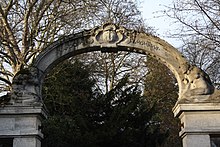Fritz Henkel Park
The Fritz-Henkel-Park is a park in the north of Unkel , a town in the Rhineland-Palatinate district of Neuwied . It is one of the largest green spaces in the city and is designated as a monument zone .
The property was donated in 1905 by Fritz Henkel (born July 25, 1875 in Aachen ; † January 4, 1930 in Unkel; buried in Düsseldorf ), the second son of the founder of the Henkel Group , Friedrich Karl Henkel , on the condition that it is used as a park and the trees remain. Today the park is also used for cultural events and civic festivals.
Villa Henkel
Villa Henkel, located in the park, was built in 1903 by Elisabeth von Werner (née Neven DuMont ) on an inherited property and sold to Fritz Henkel in 1915. An orangery was built there a year before the sale . In 1927 the villa was rebuilt in a country house style, with today's courtyard entrance being built. After the Second World War , occupation troops initially used the property. In 1960 the villa was demolished due to a lack of usability. The former outbuildings include a stately home with a farm building, which was built around 1910.
Country house
After Bonn 1949 provisional parliament and government seat of the Federal Republic of Germany had become the land rented North Rhine-Westphalia Villa to one than this country house designated temporary location for several national agencies to provide the federal government and its employees. For this purpose, the property was refurbished for around DM 170,000, and the Henkel community of heirs provided valuable carpets and paintings from their holdings. The country house was run in the form of a guest house , which charged the customer for the cost of accommodation, food and drinks. It had 60 rooms, including 30 beds reserved for representatives of the countries, as well as several meeting rooms, including a conference room with 80 seats. When the state representatives had their seat in Bonn in the spring of 1950, the facility in the Villa Henkel became obsolete. In the fall of 1950, the state of North Rhine-Westphalia ceased to operate the house, for which a subsequent use as an official guest house of the Federal Republic of Germany was initially considered - but was discarded due to the early stage of regained statehood. 1951/52 that was in the temporarily used as an exhibition building Villa Embassy of Peru home (→ List of diplomatic missions ).
Individual evidence
- ^ General Directorate for Cultural Heritage Rhineland-Palatinate (ed.): Informational directory of cultural monuments - Neuwied district. Mainz 2019, p. 62 (PDF; 6.4 MB).
- ↑ "Mr. Persil “did a lot for Unkel , Kölnische Rundschau, March 12, 2007
- ↑ a b Helmut Vogt : Bridgeheads. The beginnings of the state representations in Bonn 1949–1955 . In: Rheinische Vierteljahrsblätter , volume 64/2000, ISSN 0035-4473 , pp. 309–362 (here: pp. 318–319). ( online )
- ^ Helmut Vogt : Rhineland-Palatinate, neighbor of the young federal capital. In: Bonner Geschichtsblätter. Yearbook of the Bonner Heimat- und Geschichtsverein , Volume 49/50, 1999/2000 (2001), ISSN 0068-0052 , pp. 499–505 (here: p. 501).
- ^ City of Bonn, City Archives (ed.); Helmut Vogt : "The Minister lives in a company car on platform 4". The beginnings of the federal government in Bonn 1949/50 , Bonn 1999, ISBN 3-922832-21-0 , pp. 53/54, 206/207.
- ^ Press and Information Office of the Federal Government: Bulletin of the Press and Information Office of the Federal Government , Deutscher Bundes-Verlag 1952, p. 1094.
Coordinates: 50 ° 36 ′ 4.2 " N , 7 ° 12 ′ 59.2" E
